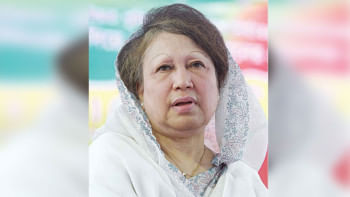Oxygen supply stretched to limit

Supply of medical oxygen to public hospitals is under strain as the demand for the life-sustaining gas has doubled over the last few weeks, posing new challenges in the battle against the second wave of the coronavirus infections.
Amidst heightened demand for oxygen, most suppliers have already stopped supplying oxygen to industries, dedicating all its production for hospitals treating Covid-19 patients.
With the second wave being much stringer than the first, more and more patients are in need of oxygen support as the highly transmissible virus, fuelled by new strains, is infecting lungs severely, causing serious breathing problems for many, hospital sources said.
Uninterrupted oxygen supply is extremely crucial in saving lives of critical coronavirus patients. Most patients are coming with severe shortness of breath and need oxygen via a high-flow nasal cannula, they said.
Officials at the Directorate General of Health Services said around 100 tonnes of oxygen are required every day to ensure uninterrupted supply at government hospitals.
Ninety percent of the supply comes from Linde Bangladesh Ltd, a multinational company, and the rest is supplied by Islam Oxygen Ltd and Spectra Oxygen Ltd, they said.
Saiqa Mazed, a spokesperson of Linde Bangladesh, told The Daily Star, "The demand for medical oxygen in Covid hospitals has almost doubled of late. To meet this demand, we are now giving more priority to producing medical oxygen than industrial oxygen."
She said they provide oxygen support to all government hospitals and some of the largest private hospitals in Bangladesh which need uninterrupted oxygen supply at the intensive care units (ICUs).
Asked whether they are facing any scarcity, she said, "In a sense, we are in dearth…"
"We have two oxygen plants in Narayanganj and Chattogram which produce 90 tonnes oxygen per day. Earlier the ratio of medical and industrial oxygen was like 60:40. The demand for industrial oxygen did not decrease, but the demand for medical oxygen has increased to 80 percent, so the ratio now is 80:20."
"That's why, we are giving priority to producing medical oxygen by decreasing the production of industrial oxygen," Saiqa added.
Linde Bangladesh, which has an oxygen plant in India, has also been bringing in oxygen from India using tankers and delivering it to hospitals to meet demand.
"On top of our total production, we are trying to get 20 percent more oxygen from India," Saiqa Mazed said.
Recently, India imposed a ban on industrial oxygen supply from April 22 to meet its huge demand.
Asked whether it would affect the supply in Bangladesh, the Linde spokesperson said, "So far, we are not facing any problem. As Linde has an oxygen plant in India, it gets an inter-company transfer.
"Even if the Indian government stops it, then ideally, a government-to-government arrangement should be there," she said.
Sources said other than Linde, a few other oxygen supplying companies which have been importing oxygen from India are facing challenges as they are now getting half of what they used to get earlier.
Mustain Billah, chief executive officer of Islam Oxygen Ltd, said they earlier used to import 30 tonnes of oxygen per week from India. Now it has been decreased to 15 tonnes due to increasing demand there.
He said the demand for medical oxygen has increased so sharply that they stopped producing industrial oxygen 20 days ago.
"We produce 28,000 cubic metres of oxygen per day. The entire production capacity is now dedicated to medical oxygen," he said.
An official of Spectra Oxygen, wishing not to be named, said they produce 25 tonnes of medical oxygen per day.
"The demand has increased now. Earlier, 60 percent of our machines used to cater to the demand for medical oxygen. Now, we are producing medical oxygen by dedicating all our machines for 24 hours," he said.
The country has been witnessing a rapid surge in deaths and infections from Covid-19 with hospitals struggling to tackle the ever-increasing spike of patients with their current ICU capacity and stock of ventilators.
Dhaka Medical College Hospital Director Brig Gen Md Nazmul Haque said although they have not yet faced any crisis of oxygen supply, the demand has increased sharply.
"In central oxygen supply, the 20,000 cubic metre tank used to go empty in three days, now it empties in two," he said.
Apart from central oxygen supply, DMCH also has 700 cylinders to support emergency patients, he said.
Asim Kumar Nath, director of Mugda Medical College Hospital, told The Daily Star yesterday that the demand for oxygen has increased by 40 percent in the last month.
The oxygen supply company is filling up the 12,000 cubic metre tank every day [at Mugda Hospital], he said, adding, "Almost every patient getting admitted to the hospital is in need of oxygen."
The authorities of New Life Hospital Ltd on Green Road said they need 20 percent more than the oxygen they are currently getting to fulfil demand.
With cylinders, a patient can be given oxygen at the maximum rate of six litres per minute. A central oxygen supply can provide much more oxygen in an uninterrupted manner, depending on supply of liquid oxygen.
There is a daily demand of 180 tonnes of oxygen for hospitals and other related industries, according to officials of oxygen supplying companies.
Linde Bangladesh produces and supplies about 90 tonnes of oxygen daily and Spectra Oxygen Ltd about 25 tonnes.
Linde and Spectra mostly supply liquid oxygen in tanks to government hospitals while they provide oxygen in cylinders to some private hospitals.
Besides, some small local companies -- Islam, Meghna and Abul Khair -- also produce oxygen on a small scale.
Apart from hospitals, there is a demand for cylinders at the retail market as a section of people is buying cylinders just in case someone in the family tests positive for Covid-19 and experience breathing problems.
Farid Hossain Miah, director (hospitals and clinics) at the DGHS, said, "We are still not facing problems but if the number of patients continues to rise, we may face problems."
"We are in constant talks with suppliers. We have asked them to raise their production, and urged the authorities concerned to give top priority to medical oxygen," he said.
Tapan Sengupta, deputy managing director of Bangladesh Steel Re-Rolling Mills Ltd, said they were still getting adequate supply of industrial oxygen.
"If there is any shortage in supply in future, it will definitely affect steel manufacturing," he said.



 For all latest news, follow The Daily Star's Google News channel.
For all latest news, follow The Daily Star's Google News channel. 



Comments